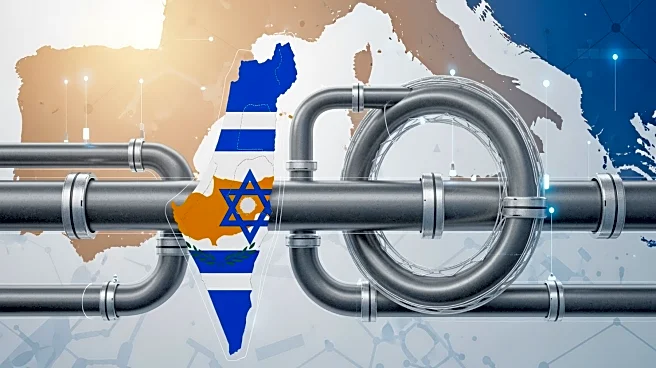What's Happening?
Energean, a company operating Israel's natural gas reservoirs, has signed a memorandum of understanding (MoU) with Cyfield Group to potentially supply natural gas to a planned power generation facility
in Cyprus. The proposal includes constructing a new undersea pipeline connecting Israel's Karish production platform to Cyprus. This project, pending approval from both the Cypriot and Israeli governments, would make Cyprus the third country to receive Israeli natural gas and the first in Europe. The initiative aims to strengthen Israel's alliances with Cyprus and Greece, contrasting with its relations with Turkey. Israeli Energy and Infrastructure Minister Eli Cohen emphasized the diplomatic and economic benefits of the deal, while Energean CEO Mathios Rigas highlighted the project's potential to reduce Cyprus's energy isolation.
Why It's Important?
The proposed pipeline represents a significant geopolitical and economic development in the Eastern Mediterranean region. For Israel, exporting natural gas to Cyprus could enhance its diplomatic influence and economic ties within Europe, potentially leading to increased regional stability and prosperity. The project could also generate substantial revenue for Israel, contributing to its economic growth. For Cyprus, the pipeline offers a strategic opportunity to diversify its energy sources and reduce reliance on more distant suppliers, aligning with broader European goals of energy security and sustainability. The collaboration underscores the shifting energy dynamics in the region, with potential implications for regional power balances and energy markets.
What's Next?
The next steps involve securing necessary governmental approvals from both Cyprus and Israel. The project's progress will likely be closely monitored by regional stakeholders, including Greece and Turkey, given the potential geopolitical implications. Additionally, the U.S. has shown interest in regional energy developments, as evidenced by recent pressure on Israel regarding a separate gas export deal with Egypt. The outcome of these negotiations could influence future energy cooperation and diplomatic relations in the region.
Beyond the Headlines
The proposed pipeline could have long-term implications for regional energy cooperation and environmental policy. By facilitating access to natural gas, the project supports a transition to cleaner energy sources, aligning with global sustainability goals. However, it also raises questions about the environmental impact of increased fossil fuel infrastructure. The project may prompt discussions on balancing economic development with environmental responsibility, influencing future energy policies in the region.








